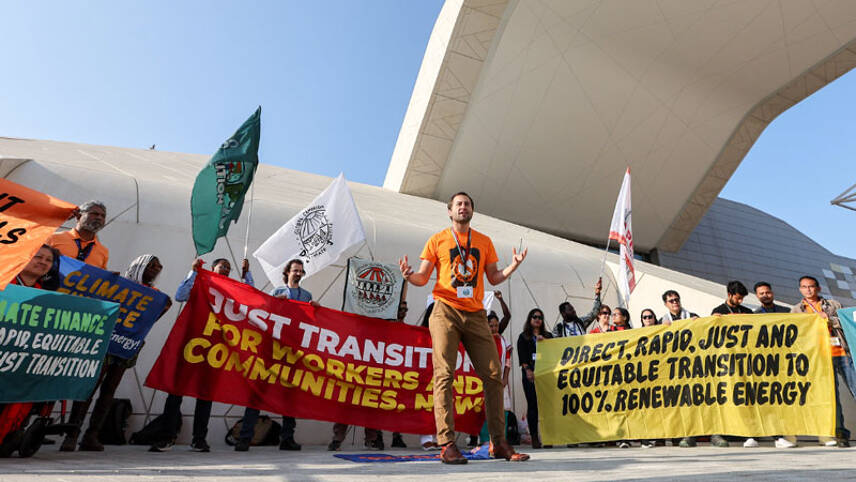This premium content is exclusive to edie Members.
To find out more about edie Membership, please click below.
If you are an existing member, login here

Image: COP28 / Mahmoud Khaled. Pictured: A peaceful demo for a just transition at this year's UN climate summit, in Dubai
The Global Tipping Points report, out today (5 December) from a coalition of academics convened by the University of Exeter, assesses how close the world is to 26 negative Earth tipping points.
These are points of no return, past which damages will materialise at a faster pace. Damages can relate to the topic itself but also create cascading risks across systems. One tipping point, for example, is rainforest loss – particularly in the Amazon. Cascading impacts include biodiversity loss, changes to water systems and a reduction in carbon sequestration.
In the main, the conclusion is that human action has pushed the world dangerously close to several of these tipping points. Some will almost certainly be activated in the coming years. The report warns that business-as-usual is no longer an option and an “emergency footing” is needed.
Assessments of planetary boundaries have made similar conclusions before. But this analysis also presents a string of positive tipping points which, if reached, would bring about exponential change relating to climate mitigation and adaptation, ecosystems and livelihoods. The focus is not only on what must be transitioned away from, but what must be worked towards.
Dr Steve Smith at the University of Exeter summarised: “Many areas of society have the potential to be [positively] ‘tipped’, including politics, social norms and mindsets.
“Human history is full of examples of abrupt social and technological change. Learning from these examples, we must switch our focus from incremental change to transformative action – tipping the odds in our favour.”
Today’s new report sets out six key asks for those at COP28, the UN’s annual climate summit currently ongoing in Dubai, to help bring about these positive tipping points.
Chief among them is immediate action to phase out fossil fuels, putting the world on track to dramatically scale back production and consumption before 2050. This has proven to be a big sticking point at COP28 given the host nation’s status as a petrostate. Strong rhetoric is on display on coal, but nations rich in oil and gas, as well as energy companies, are on site blocking an agreement on a total fossil fuel phase-out.
COP28 President Dr Sultan Al Jaber stated on Monday (4 December) that it is “inevitable” that fossil fuels will be phased down and eventually out, contradicting previous comments made outside of COP and raising eyebrows from his coworkers at ADNOC, the UAE’s state-owned energy conglomerate.
The tipping points report emphasises that time is of the essence with a rapid and well-managed energy transition needed.
There also needs to be an equally concerted effort to deliver a well-managed transition in agriculture, which globally produces almost as much methane as fossil fuels each year. The report stipulates that net-zero agricultural systems can – and must – be delivered before 2050.
Take five
The other five key recommendations on bringing about positive tipping points are:
- Dramatically scaling loss and damage and adaptation finance in terms of total levels as well as distribution and accessibility
- Including tipping points in national climate plans submitted to the UN under the Paris Agreement
- Convening an urgent, UN-led global summit on tipping points
- Coordinating coalitions of organisations to develop and implement policy efforts
- Deepening tipping points knowledge through enhanced science-policy engagement
Loss and damage in focus
On loss, damage and adaptation, the report speaks of an “urgent impetus” for the UN to strengthen its loss and damage governance. It states: “Some earth system tipping points are now likely to be triggered, causing severe and spacially uneven impacts on societies and interconnected ecological, social and economic systems.
“Tipping point impacts will be felt worst by the most vulnerable communities within and between nations, with knock-on impacts for global inequality, the stability of the world economy, and geopolitics.”
Back in 2009, wealthy nations pledged to provide $100bn annually in loss and damage financing to Global South nations on the climate crisis frontlines. This pledge was operationalised in 2015 but has not yet officially been met in any given year.
COP28 opened with the operationalisation of the world’s first dedicated loss and damage fund, which was agreed upon at COP27 last year following U-turns from the likes of the EU and the US. It has attracted some $725m of pledges so far. Global South nations are now pushing rich nations to increase their commitments and for more information to be provided on when, where and how the fund will pay out.
At COP28, nations will seek to agree on a new annual figure beyond the $100bn. We can expect debates on what the level should be and whether back-payments should be encouraged or required.


Please login or Register to leave a comment.